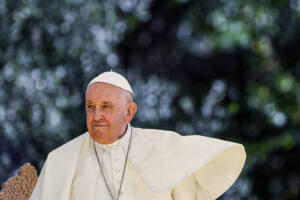WelCom May 2024
‘Seeds of Hope’
For this year’s Laudato si’ Week and Pentecost, we are invited to gather in community to contemplate and nurture seeds of hope for our ‘suffering planet’ (Laudate Deum 2).
Laudate Deum is an apostolic exhortation by Pope Francis, published on October 4, 2023 – the 2023 Feast of St Francis Assisi – as a follow-up to Francis’ 2015 encyclical Laudato si’.
Laudate Deum is a reminder about the urgency of the Laudato si’ message and the need for both personal and cultural transformation amidst our ecological and climate crises.

Ian Munro
A couple of years ago I wrote a reflection, The Cry of the Earth, on Pope Francis’ 2015 encyclical letter, Laudato si’, and the views of other religious leaders. Since then, I’ve found myself more focused than ever on the climate crisis facing our planet, our common home.
The more I’ve read, the more I’ve become aware that the balance inherent in Earth’s complex systems is becoming increasingly shaky and any natural rebalancing of Earth’s systems is unlikely to be advantageous to human life as we know it. The systems have already lost a certain amount of the stability that has existed since the last ice age – this stable period that gave rise to civilisation as we know it. In the past, collapses of Earth’s systems have led to five mass extinctions that we are aware of. Are we headed for a sixth mass extinction? One that includes us?
Pope Francis, too, has become more and more concerned about climate issues and in October last year, he felt compelled to follow up Laudato si’ with an apostolic exhortation, Laudate Deum1, as a result of the inadequate response to the climate crisis since 2015.
Laudate Deum is a very readable, comprehensive summary of where we are at, what is coming our way if we fail to adequately respond and what that response might look like. Since it is so readable, I won’t spend much time on the detail of the content. However, I will mention his strongly held view that, whatever the effects of climate change, they will be felt first and most dramatically by the most vulnerable people, both here and around the world.
“There are no lasting changes without cultural changes…and there are no cultural changes without personal changes” (LD 70)
It is indubitable that the impact of climate change will increasingly prejudice the lives and families of many persons. We will feel its effects in the areas of healthcare, sources of employment, access to resources, housing, forced migrations, etc.
[LD 2]
It concerns me that one of the cruellest outcomes will be those who have done the least to cause climate change are likely to be the first and worst hit. The cry of the earth and the cry of the poor are inextricably linked.

The theme for this year’s Laudato si’ week, ‘Seeds of Hope’, is inspired by the symbol for Season of Creation 2024, ‘first fruits’, inviting us to be seeds of hope in our lives and our world, rooted in faith and love.
Not of interest to economic powers
While not every individual climate-related disaster can be attributed to climate change, and this fact is used by many to deny the reality of what is happening, there is solid evidence we are experiencing a warming that won’t take thousands of years to imperceptibly occur like previous climate variations. It is happening before our very eyes.
Yet, as Francis points out, …‘this isn’t a matter that interests the great economic powers whose concern is with the greatest profit possible at minimal cost and in the shortest amount of time.’ [LD 13]
I also find it worrying that, as global conflicts escalate almost on a monthly basis, world leaders, including our own, are becoming more and more preoccupied with throwing missiles at each other’s countries rather than throwing everything possible to avoid an increasingly inevitable climate breakdown. So, not only is it in the interests of fossil fuel producers to limit climate action, it’s also in the interests of the armament industry to have war as a prime focus for budget expenditure.
Leadership
United Nations Secretary-General, António Guterres, holds the view that, as we move from global warming into what he calls the ‘era of global boiling’, we could still avoid the very worst of climate change but only with dramatic, immediate action. ‘Leaders must lead. No more hesitancy, no more excuses, no more waiting for others to move first. There is simply no more time for that.’2
These comments echo those Pope Francis made in 2015 about the lack of leadership being a significant problem.3 In his address to last December’s COP28 he reminded the leaders present it was their responsibility to craft appropriate concrete and cohesive responses that reflected the nobility and the dignity of their role as leaders.
In the end the purpose of power is to serve. It is useless to cling to an authority that will one day be remembered for its inability to take action when it was urgent and necessary to do so.4
Recent actions by the leadership of our new government aren’t all that encouraging in this respect. There have been a number taken in their first 100-plus days that could be said to be less than climate-friendly (and others less than low-income friendly, relevant but another story), so let us pray that the government has some more radical, climate-friendly policies up its sleeve. However, the placement of the environment and climate ministers outside of cabinet, and therefore outside the key decision-making process, does not give great confidence that this is the case. Time will tell how that will play out. Unfortunately, I don’t think time is on our side.
Nonetheless, every little bit helps, and avoiding an increase of a tenth of a degree in the global temperature would already suffice to alleviate some suffering for many people. Yet what is important is something less quantitative: the need to realise that there are no lasting changes without cultural changes, without a maturing of lifestyles and convictions within societies, and there are no cultural changes without personal changes. [LD 70]
People power
Therefore, if change is to occur, it is people power that will make it happen.
The demands that rise up from below throughout the world, where activists from very different countries help and support one another, can end up pressuring the sources of power. It is to be hoped that this will happen with respect to the climate crisis. For this reason, I reiterate that “unless citizens control political power – national, regional and municipal – it will not be possible to control damage to the environment”. [LD 38]
So here is something to ponder: there are 1.375 billion members of the Roman Catholic Church5 and 2.6 billion people in total identifying as Christian.6 That is an awful lot of people power that could be mobilised; people of faith who, more than anyone else, should be working tirelessly to protect God’s creation.
What is stopping this happening? While there is the obvious economic interest factor and the lack of effective leadership factor, I would hold there is another significant factor also at play that is little talked about – the interests of the ‘comfortable classes’. Why change when life is okay? Why make sacrifices beyond a bit of recycling and reusable shopping bags when personally I feel no need to? That, I would argue, is where people power has currently stalled.
So, could homo sapiens become the first species to wilfully manage its own extinction? Possibly, if we fail to bear in mind Pope Francis’ comment after the release of Laudato si’. He said that, while God always forgives, and we sometimes forgive, nature never forgives. If you give her a slap, she’ll give you one right back.7
In his COP28 address, he said that the climate is calling out for us to halt our obsessive drive to produce and possess that has led to our unbridled exploitation of the environment and the illusion of omnipotence that we have. We need to recognise our limits with humility and courage because, ‘when human beings claim to take God’s place,’ as we are warned in the final words of Laudate Deum, ‘they become their own worst enemies’.
Ian Munro is a member of Our Lady of Hope Parish Tawa-Titahi Bay and a member of the Archdiocese of Wellington’s Ecology, Justice and Peace Commission.
Endnotes
1 Pope Francis, Laudate Deum, 4 October 2023
2 Antonio Guterres, UN Press Conference, 27 July 2023
3 Pope Francis, Laudato si’, 24 May 2015, 53
4 Pope Francis, Address to COP 28, Dubai, 2 December 2023
5 Vatican News, 20 October 2023
6 Status of Global Christianity 2024, Center for the Study of Global Christianity, gordonconwell.edu
7 Pope Francis, Press conference on flight from Sri Lanka to the Philippines, 15 January 2015
Prayer inspired by Psalm 51(50)
Be merciful, 0 Lord, for we have sinned.
Have mercy on me, 0 God, in your goodness;
in the greatness of your compassion
wipe out my offences against the gift of your Creation.
Thoroughly wash me from my guilt
and cleanse me of my ecological sins.
For I acknowledge my offense against you, Creator God,
my ecological sins stand now before me:
In my broken relationship with your Earth and my fellow creatures,
against You and your divine will have I sinned.
Create a clean heart in me, 0 God, through your Creator Spirit,
and renew my Christian vocation to care for your Creation.
Help me hear and see your message of love in Creation,
and sustain in me a willing spirit of ecological conversion.
By the grace of your Son, our Saviour Jesus Christ,
Redeemer of the whole cosmos,
Amen.
Source: Laudato si’ Movement